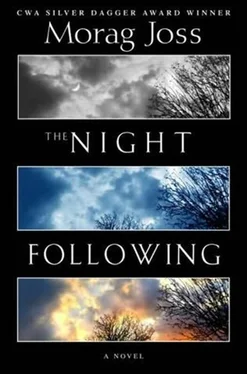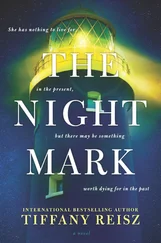
Morag Joss
The Night Following
© 2008
Permission to reproduce “I live in a world I have not created” by Elizabeth Jennings, from her collection Relationships,
published by Macmillan, is granted by David Higham Associates Limited.
For this UK edition of The Night Following I would like to express grateful thanks to Duckworth Publishers and in particular to Peter Mayer, Tracy Carns and my editor Mary Morris.
For her generous and insightful editorship of the novel for its original publication in America, I am most grateful to Kate Burke Miciak at Random House.
I am indebted also to my two wonderful agents, Maggie Phillips at Ed Victor Limited in London and Jean Naggar of the Jean V. Naggar Literary Agency in New York. They are so much more than agents; I appreciate deeply their warmth, kindliness, optimism and faith.
Permission to use the Mimosa poem, written by Maria G. Bracchi-Cambini and dedicated to her daughter Joan, was very kindly given by the late Joan’s brother Bert and her daughters Sue, Anne, and Carol. Thank you.
Finally, I wish to thank my friends and my daughter Hannah, who in their various adorable ways kept me going during the writing of this novel.

Something tells me it’s important not to look dangerous. You would think I’d be beyond it by this time, the old dread of making scenes, but I do want to get it done quietly, with the niceties observed. With some respect for finer feelings, though whose exactly it’s hard to say at this point. If I could be sure of that, if I could be sure they’d take me with an attitude of courteous regret, of sorrow even, that reflects my own, I’d do it today. I would.
My hair and shoes are a little unfortunate but I could make myself tidy. I could practise the proper face in a mirror first. There’s not much I can do about the bones around my eyes that have a bluish, knuckly look about them now, but I think I could upturn my face so it resembled the mask expected of reasonable women entering this supposedly balanced and amiable chapter of middle age. I could clear my throat and imitate the rounded, sprightly cadences of such women’s voices and say-what?
Suppose for instance I said, in that singing-out manner, Oh, excuse me! Could you help? I’m afraid something has happened.
As if I’d dropped a jar at the checkout. Would that be the correct thing?
There must be a right way and a wrong way, as there is for everything. I believe turning up at a police station might be customary, insofar as my particular circumstances are customary. But police stations aren’t in obvious places anymore and I could waste all day looking for one. Or I could dial 999, although call boxes aren’t in obvious places anymore, either. And they would ask me what’s happened because how else are they to know who to send-police, ambulance, or fire engine-and I couldn’t begin to go into it all on the telephone. But what is the emergency, they’ll insist. All I could tell them is that I think I am. I may be the emergency. It’s true that I would be emerging. I would be appearing unexpectedly after a spell of concealment. Surely I must be the emergency. What else could I say? That there’s been an accident?
Once they saw I wasn’t dangerous, I suppose for a time at least they’d prefer to think of me as sick. Indeed, I could just walk into a hospital. That worked before, after a fashion. I could just walk into a hospital, and nobody would ask if I actually believed I could ever find help there for what afflicts me.
The truth is I’m neither sick nor dangerous. I’m merely displaced. Not that that makes me unique. You’ve seen me, or someone like me, anywhere out of the way and out of season, run-down, closing down and in decline, though I may have escaped notice unless you happened to catch me in a small space between thoughts of your own. You will have seen me in odd, deserted places: a woman alone on a bridge, or standing by the roadside at a strange and hazardous point where weeds are sprouting, perhaps just loitering near an inexplicably derelict bus stop. I’ll remind you of loneliness or old age, or that winter’s setting in.
But most often I’ll be in restless places, the passing points of departure and arrival between various somewheres. I’m the one apart and hesitant in the waiting rooms of stations, under the arc lights of ticket halls and in the corner booths, hovering at turnstiles and gates, never quite joining queues nor scanning information boards, yet never unaware of the human traffic. I stay in by the wall, sidestepping the tide of those in genuine and deliberate transit, dazed yet somehow impervious, lost but not utterly bewildered. I drift just outside the echoes and thrums of journeys that are not mine, the endings and beginnings of missions, diversions, pilgrimages, expeditions. I observe lives unlike mine, full of imperative planned destinations, and I envy people this apparent conviction that their myriad tiny events, their moving towards events yet to be, are of some importance. Neither a proper impetus to travel nor a true purpose in remaining where I am falls my way. I lack reasons either to go or to wait, and this looks like failure in me.
Not that I am at all disgraceful. I am never drunk. I don’t mutter. I don’t carry my belongings in a bundle. It may be stained and tatty but I do have luggage, and I tend also to have an address, albeit it’s always temporary. I manage to keep out of hostels, mostly. Once a day I endeavour to eat at a table, wherever there’s a bargain (jumbo platter, hot drink, £3.99) and whether or not it’s a proper mealtime. Also once a day I’ll spend up to an hour nibbling on most of a sandwich and then wrap and pocket the crusts for later. I’m a hoarder, not a scavenger; I admit I never spend money on a paper (and actually it suits me not to read the news before it’s old and discarded) but I would not dream of polishing off abandoned cups of coffee. It’s true that I’m not above helping myself to forgotten gloves and scarves. Once in winter I took a man’s coat, left on a bench.
So my vagrancy is unspectacular. I wear a taint of rationing, that’s all. I have the thready, ashamed look of a reduced person who assumes there is worse reduction to come, who lingers until the last minute where it’s warmest before boarding the final bus or train, or who walks away from the dark station as the grilles rattle down because nobody waits for her in the evenings.
But tomorrow, though it’s hard for me to speak loud enough for you to hear, I’ll try again. I’ll take a sly, off-centre interest in your moments of parting and greeting, look too closely at your clothes, the magazine you carry. Your polite glance when you ask if the seat next to me is free I’ll take as an invitation.
Yes! Though it’s none too clean.
No. Oh well, it’ll do.
I’m overglad to be spoken to, so that far too soon and whether you replied this way or not, I’ll turn to you with a remark too intricate, an anecdote too unlikely and revelatory. Yes, the pigeons here are awful, aren’t they? I met a woman once who got worms off a bench, from the droppings, she said. Filthy, it was. Much worse than this! After that she wouldn’t sit anywhere in public without spreading the seat with newspaper first. Once she stood an entire night because she hadn’t got any. But you can’t win, can you, because that played merry hell with her veins, which was worse than the worms. Or so she claimed.
Читать дальше














